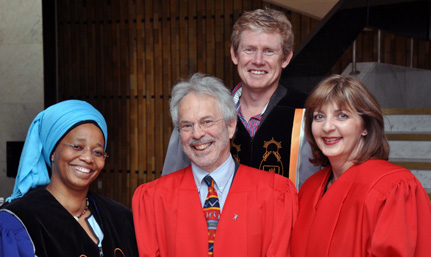Latest News Archive
Please select Category, Year, and then Month to display items
12 January 2024
|
Story Nonsindiswe Qwabe
|
Photo Sonia Small
 Since joining the UFS in 2008, Dr Grey Magaiza has worked extensively on approaches that can foster the socio-economic transformation of societies.
Since joining the UFS in 2008, Dr Grey Magaiza has worked extensively on approaches that can foster the socio-economic transformation of societies.
“The future should be one where communities can decide on their development agenda and futures. That’s the most important for me.” Dr Grey Magaiza, Deputy Director of the Centre for Gender and Africa Studies (CGAS) and Head of the Community Development programme on the Qwaqwa Campus, is passionate about capacitating communities to be agents of change and advancement. His vision for the future emphasises the empowerment of communities to take charge of their development by actively participating in decision making and the implementation of development projects that can improve their lives.
Since joining the UFS in 2008, Dr Magaiza has worked extensively on approaches that can foster the socio-economic transformation of societies. Over the years, he has crafted his research speciality into one that he is most proud of – being an interdisciplinary scientist immersed in the development of communities.
“I’m in a fortunate position of researching what I like. I say ‘fortunate’, because I’ve taken the time to understand what I’m passionate about, which is the overall field of rural livelihoods and livelihood futures – in short, community development. My research starts from an engaged university, understanding the elements that a university must use to enhance transformation and relevance to its immediate community in terms of development.”
One of the ways he has done this is by looking at social entrepreneurship as a development approach for young people in a rural setting. Through workshops with non-profit and civic organisations in Qwaqwa, Dr Magaiza has been helping these organisations to map out their needs and actively meet them through the involvement and support of external role players.
“We understand that communities are part of the national development agenda, but even that national agenda respects community knowledge and intentions and allows communities to shape their identity. A critical enabler of this is community organising. You bring back the capacity in communities to have dialogues on issues affecting them as spaces for engagement, knowledge exchange, and for people to just talk about their way forward.”
By enabling communities to define their development agenda, they can address their specific needs, challenges, and aspirations, he said. “When I look at livelihood futures, it’s quite an exciting aspect of my work – it’s like looking into a fortune tellers’ globe, because you’re not deciding for communities what they should do, but the communities themselves take those decisions.”
UFS Celebrates Africa Day
2013-05-24
|
 |
|
At the Africa Day Memorial lecture was, in front from left: Dr Choice Makhetha, Vice-Rector: External Relations; Prof Henning Melber and Prof Heidi Hudson, Head of the Centre for Africa Studies. At the back is Prof Lucius Botes, Dean of the Faculty of the Humanities.
Photo: Stephen Collett
24 May 2013 |
Prof Henning Melber: Lecture (pdf)
The University celebrated the 50th anniversary of Africa Day by hosting the annual Africa Day Memorial lecture. Hosted by the Centre for Africa Studies (CAS), celebrations included a day-long colloquium which looked at the continent from various disciplines.
Delivering the Africa Day and also his inaugural lecture, Prof Henning Melber, Extraordinary Professor at CAS, spoke about the mystifying power of ideology and identity with regard to Africa and Africa (n) studies.
Before his lecture, senior professors from different faculties took part in a colloquium, delivering papers on a variety of topics relevant to the continent. In a session on historical-political legacies, Prof Hussein Solomon, Senior Professor in the Department of Political Science, spoke about Critical Terrorism Studies and its implications for Africa. He was joined by Prof Jo van As, Head of the Department of Zoology and Entomology, who spoke about the legacy of colonialism on the conservation of Africa’s river systems. Others topics which were addressed, included the development of sign language, cardiac medicine and science and mathematics education in Africa.